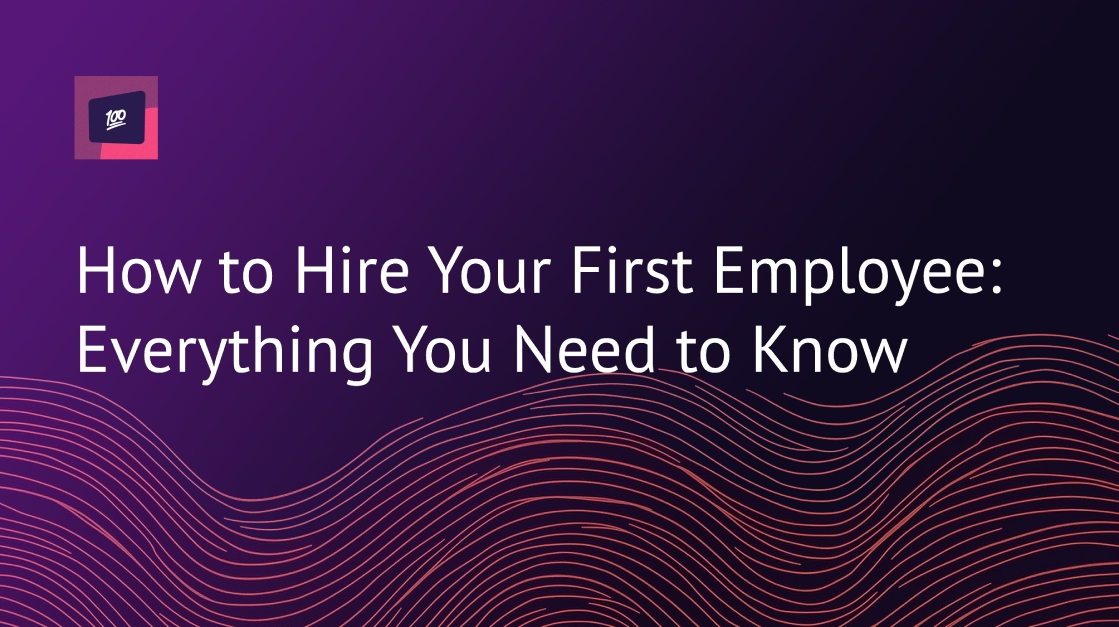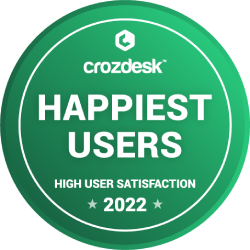How to Hire Your First Employee: Everything You Need to Know

It may take a month or it may take a year, but as your company starts to grow, you will eventually come to a point where you need to hire your very first employee. This is, undoubtedly, exciting: it indicates that your company has value. It also means that a new person is joining you who is going to dedicate their time and effort to grow your brand faster.
It is often said that your first hires are the most important, and there is truth in that. Therefore, before jumping into the process and bringing to the company just anyone, there are many things you need to take into consideration.
the best candidates faster



To help you navigate the hiring process, in this article we take a look at how to know if it's time to hire the first employee, what questions you need to ask before starting the process, and what steps you need to take in between.
Questions you need to ask
Are You Busy Enough?
This is not so much about the daily work you do, but the ups and downs your business is experiencing. For example, you may have a seasonal business (e.g. a store in a tourist location) or an eCommerce store experiencing frequent ups and downs. During the peak season, you may be tempted to hire help.
But this may not be the right thing to do. Before you make up your mind to bring your first employee, you need to make sure that you'll have enough tasks for them at all times.
"This person is likely to be with you for a long time and should be enthusiastic towards where your firm is heading," comments Ruban Selvanayagam auctioneer of Property Solvers.
An alternative to this is to hire contract-based employees or outsource the work, if possible. You may even take up an intern and teach them everything they need to know about the job.
On the other hand, if you are constantly overwhelmed with mountains of work and the number of clients continues growing, it's probably the right time to bring some help.
Are You Ready to Handle Legal and Financial Parts?
While many make the mistake of thinking that hiring an employee means simply bringing them into the company and paying them a specific amount, this is far from being the reality.
No matter which country or state you live in, there certainly exist laws and rules you should be aware of. And complying with them requires certain resources you should be able to dedicate. Here are some key things you need to consider:
- You need to be financially stable enough to pay the employee at least the minimum wage every month;
- You need to bring your taxes in order;
- You need to follow workplace regulations, maintain a record of hours worked, and pay for the overtime;
- Include some employee benefits that also comply with laws and regulations;
If you are not sure that you currently have enough resources to comply with the employment laws of the place your business is based, maybe you should think of postponing the hiring process. Expense management solutions, or even a simple Excel spreadsheet can help you keep your expenses to see whether you are ready for your first hire.
What Do You Expect From Your New Employee?
This question may seem unexpected, but in reality, it’s crucial to answer it before you start the hiring process so that you find the right person.
Whether it’s an internet business or a brick-and-mortar store, chances are, in the starting stages of your brand, you probably wear many hats. For example, you may need to handle the inventory, packaging and shipping, customer support, promotional efforts, and other key operational parts.
So, when you start thinking of hiring an employee, you need to ask yourself what do you expect from them? Are you looking for a person who will manage many things at once, or are you looking for someone who will, let’s say, take over your promotional efforts? This is key to understand because in these two cases, you need two entirely different people. In the first case, you are probably looking for an enthusiastic self-starter, while in the second case you need a person with a specific skill set, such as social media management, SEO, or SMS marketing.
Knowing what it is that you expect from your employee will save you the frustration of ending up with a wrong fit, and will save you both precious time and resources.
Time to Hire
Once you are sure that it’s the right time to hire an employee, have all your legal issues under control, and know exactly what you are expecting from your employee, it’s time to start the hiring process. Here are 7 steps you need to pay attention to.
1. Set a Salary You Are Ready to Pay
After you calculate your resources and understand the tasks your employee will be working on, you need to define the salary you are willing to pay. Don’t settle for a fixed number, but rather define a salary range, depending on the skills of the employee. You need to also consider the classification of the employee and the minimum wage, based on the local regulations. When finalizing compensation details, it's important to maintain accurate financial records by creating your pay stubs, ensuring transparency and compliance with payroll standards.
2. Post a Job Opening With a Detailed Description
Next is getting the opportunity out there. You need to decide how you are going to find the ideal candidate. Hiring platforms are one of the most common options, but spreading the opportunity through social channels and word-of-mouth can also attract qualified candidates.
No matter where you choose to post the opening, be sure to have a detailed description of the position. There, tell the potential applicant about the company, what are they going to get by joining your team, as well as what do you expect from them and what the required qualifications are.
What comes to posting the salary range, there is not a single answer. Some human resource professionals believe that it’s a good way to filter out the candidates who don’t feel comfortable with the proposed range, thus saving time and effort for both of you. While others believe that it should be discussed in detail during the interview.
3. Don’t Rush
When looking for a new member of your team, it's natural that you want to find the right person as soon as possible. In this situation, the urge can be to quickly advertise the position and hire the first person that seems like a good enough fit.
While this may be tempting because of its simplicity, you should resist this urge. The first person you will hire will play a crucial role in the success of your business, and going with the wrong person may have quite serious consequences.
Instead, put in a little more effort into finding the right person. While this may take considerably more time, several rounds of interviews, and maybe even a new job posting, doing this will save your time and financial resources further down the line.
4. Conduct an Interview
Once you filter the resumes and select several ones that fit your needs the most, it’s time for an interview. Interviews are a great way for the employer to get to know the applicant better. It’ll also give the potential employee a feel for the company.
Have a list of well-thought-out questions you feel are important to address, both personal and professional. Again, check with the law as there may be some questions that are off-limits and may seem discriminatory. Choose the questions in such a way that the answers will give you a well-rounded idea of the person sitting in front of you.
5. Check Their Skills And Aptitude
While this is not a mandatory step, many companies opt to give the applicant a small task to check their skill or attitude. It often happens that people are quite good at handling interviews and know how to answer the questions based on their previous experience, but during the work, they may lack the necessary skills. A task similar to what they will be doing as part of your job is a good way to see what they are good at. For example, if it’s a graphic designer position, you can create a scenario to understand whether they can use necessary tools like Adobe Photoshop, or whether you’ll need someone more skillful.
6. Look For Someone With Integrity And Resourcefulness
As an employer, when looking for someone to join your team, you want someone who not only can get the job done, but someone you can trust too. When Interviewing the candidate, try to understand their motivation and whether you can rely on them in difficult situations. Because you are a small team, each member plays a central role, and trust towards each other is critical.
It's also important that all team members are flexible and resourceful enough to quickly adapt to changing situations, which, as a small business, you'll not lack. Someone who has difficulty mastering new skills, changing their working habits, or adjusting to new tools and methodologies may not be the right person, even if they initially seem to have all the essential skills.
7. Pay Attention to Their Potential
Successful hiring managers know that very often potential means more than already existing skills and knowledge. So, if you notice that someone doesn’t yet have all the necessary skills, but has the passion, desire, and interest to learn, don’t dismiss them: they may be just the person you are looking for. You may need to invest a little more time and effort into training them, but this will help them unleash their true potential.
8. Consider Your Weaknesses
Before you or your co-founders hire your first employee, chances are, you've all been in the "jack-of-all-trades" role, from managing A/B testing in email marketing and technological aspects to packaging and logistics.
Hiring your first employee is not only a chance to get some of the work off your shoulders but also to organize it better. That is, create separate roles for different people with different responsibilities.
A way to do this that will maximize the benefit for your business is to hire a person who balances out your weaknesses. For example, if customer support is not your strongest suit, hiring someone who has experience in the role may be a wonderful addition to your team. This makes delegating tasks much easier, while improving the overall outcome.
9. Design an Onboarding Process
Once you make a final decision about the hire, and they officially join your team, you’ll need to onboard them on the company and the working process. This can be done as a simple conversation, where you tell them everything they need to know about the brand and the company values. Employee onboarding can also be in the form of training to educate newly hired employees about their job responsibilities, as well as, what tools/software they are going to use and, most importantly, how they should use them. If you are a retail company, you might be using eprocurement software, CRM, and other software to automate business processes, so make sure to include thorough training on these software systems during the onboarding process. Or you can do this in a more official (and much more practical!) way by creating an employee onboarding checklist they can refer back to later. Such a checklist can be used once you start hiring more people, and the onboarding processes start to become more and more official. During the onboarding process and after, make sure to fully treat them as part of a team that works towards a common vision.
10. Establish A Test Period
While interviews and tasks can tell quite a lot about the skills of the candidate, they are not enough to give a clear idea about the character. It may also happen that while the candidate has all the required skills to perform well, for some reason they are not a very good fit with the company culture.
To understand this and before you sign a legacy contract with the employee, establish a test period. This can be from one week to a month, or even longer. This period can help you learn about the person, see them during work, as well as how they interact with you and your team. If they are, for some reason, not the right candidate, it's easier for you to part ways than in the case of already official employment.
11. Sign an Employment Contract
Once you’ve found the perfect candidate, they’ve passed the trial period and agreed to join your team, prepare and sign the contract. For small startups, it may sometimes not seem to be a priority, but getting this done right away can spare you from legal problems later. This should be done according to the local rules and regulations.
Final Thoughts
Human resources, while crucial for the company's growth, are also a considerable investment. Finding the right person, training, mentoring, and coaching them, especially if you are doing it yourself, can be time-consuming. However, in the long term, this is the most important investment you are going to make. While becoming someone's employer may seem overwhelming at first because of the sheer amount of responsibility, know that the efforts will be worth it in the end.
the best candidates faster




